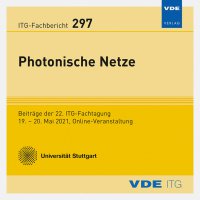Combining Scrambling and Multilevel Coding for Physical-Layer Security
Conference: Photonische Netze - 22. ITG-Fachtagung
05/19/2021 - 05/20/2021 at Online
Proceedings: ITG-Fb. 297: Photonische Netze
Pages: 8Language: englishTyp: PDF
Authors:
Pfeiffer, Johannes; Fischer, Robert F. H. (Institute of Communications Engineering, Ulm University, Ulm, Germa)
Abstract:
In fiber-optical communication systems, security against wiretappers is of importance. To counteract successful eavesdropping, classical encryption schemes may be complemented by approaches following the concept of physical-layer security (PLS), e.g., the application of suited coding and modulation schemes. In a Gaussian wiretap scenario, the security level may be quantified by the security gap. A recent strategy for PLS is to scramble secret messages prior to transmission, in particular using self-synchronizing scrambling schemes. The combination of channel codes with bit-wise scrambling enables a significant security increase compared to conventional coded transmission, as the error rates at the legitimate receiver are hardly affected. In contrast, an eavesdropper operating at slightly worse channel conditions experiences bit error rates close to 0.5 due to the error multiplication in the descrambling process. An additional security increase can be achieved by a suitable choice of the coded modulation scheme in case of higher-order modulations. Especially the application of multilevel coding (MLC), where scrambled messages are transmitted exclusively over the lowest bit level, yields smaller security gaps than bit-interleaved coded modulation (BICM) if the same channel code and scrambling scheme is utilized. However, this comes at the cost of a decreased secure transmission rate. In this paper, low-density paritycheck (LDPC) codes are applied and combined with various scrambling schemes. The results are compared to theoretically achievable security gaps, which are derived considering perfect scrambling, where any non-zero number of errors prior to descrambling is assumed to result in 50% erroneous bits.


